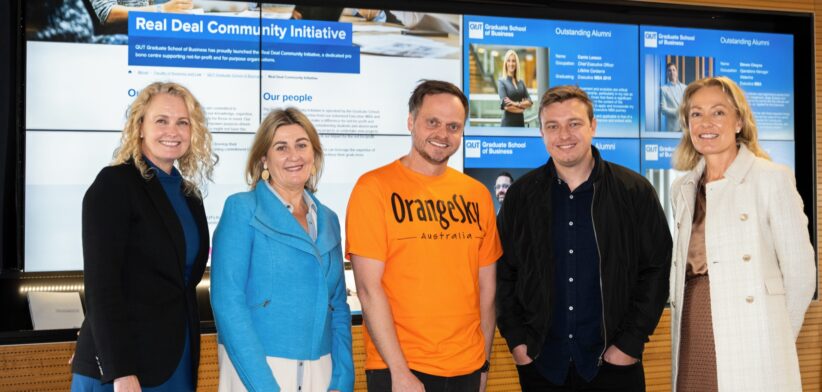Some of Australia’s most prominent not-for-profit organisations have joined with a Brisbane university to create a pro bono centre to empower purpose-led businesses and promote social enterprise as a rewarding career.
Through QUT’s Real Deal Community Initiative, MBA and Executive MBA alumni and students will partner with not-for-profit and for-purpose organisations to enhance the impact of critical projects.
Head of the QUT Graduate School of Business Professor Sarah Kelly said Orange Sky, Juiced TV, LifeFlight, Healthy Land & Water, The Heart Foundation, Asthma Australia, UN Women Australia, and Artisan were inaugural industry partners.
Professor Kelly said the pro bono centre would empower purpose-led organisations to embark on endeavours for which they may not currently have the expertise, resources, or capacity.
“The Real Deal Community Initiative is the first of its kind in the region and gives our MBA students the unique opportunity to contribute their expertise to non-profit organisations and socially impactful projects,” she said.
“This initiative aligns with the QUT Graduate Business School’s commitment to fostering responsible leadership and social responsibility among our students and positively impacting our community.”
Professor Kelly said the centre would also be an opportunity for not-for-profits to share their strengths with potential future leaders.
Orange Sky Chief Operations Officer Shayne Herriott said he was keen to highlight how agile and innovative the not-for-profit sector could be.
“This is a sector where genuine innovation is possible,” Mr Herriott said. “You can apply your skills in so many different ways and help so many different organisations and start your own business and make your own difference in the world.
“In Queensland on any given night there are 800 families in motel accommodation used as transitional housing where we identified a need and within a month we were up and testing and getting something working.”
Juiced TV Director Ben Forbes said the challenges to secure philanthropic dollars would continue to drive opportunities for innovation and rewarding careers for people wanting to make an immediate impact.
“We love the opportunities we have to transition volunteers or contractors into employment, particularly for younger people,” Mr Forbes said.
“The fundamentals of business exist in a charity, there’s just slightly different channels or tactics for execution and it’s really lovely to see a new generation of talent coming through wanting to make an impact with a career here.”
Professor Kelly said the not-for-profits faced the same problems as any other sector around sustainability strategy and financials, as well as access to people and resources, and increasing compliance and risk assurances.
“Some of the key skills of an MBA are around those areas and that’s what makes this opportunity so unique on both sides,” Professor Kelly said.
Healthy Land & Water CEO Julie McLellan said joining the Real Deal Community Initiative would help build the impact of charities as they look to commercialisation and strategic partnerships in challenging economic times.
“There are real careers and real meaning in our sector and all of us are in this for a purpose,” Ms McLellan said. “But we still want to make profit. Because we want to put it back into our purpose.”








